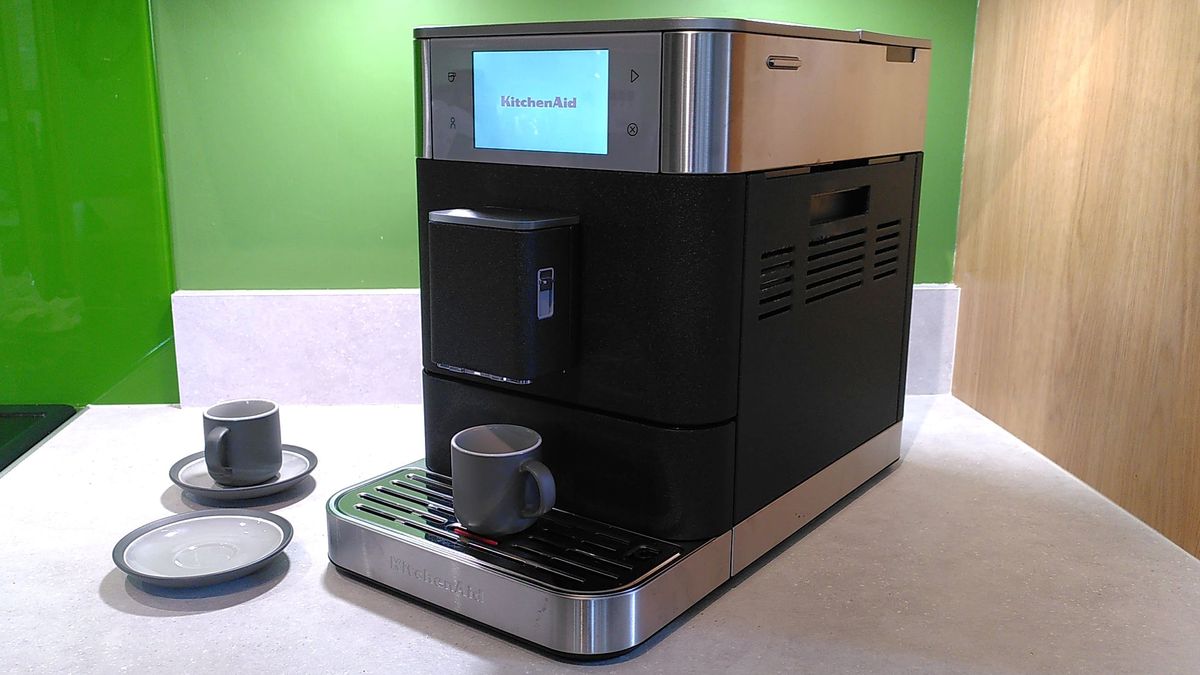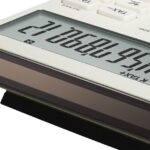KitchenAid Fully Automatic Espresso Machine KF8: two-minute review
The KitchenAid Fully Automatic Espresso Machine KF8 is a truly premium bean-to-cup espresso machine, which automates the entire coffee-making process, but also gives you a surprising amount of control over your drinks. Each of the many drink types can be customized with your preferred strength, body, temperature, and volume – preferences that you can then save to your personal profile so everyone in the household can have their coffee exactly the way they like it.
The KF8 comes with very few instructions, but once you power it on, you’ll realize that’s because it doesn’t need them. You will be guided through every step of preparing the FK8, loading beans, filling the tank, and brewing your coffee with clear instructions and illustrations on the bright, responsive 5in touchscreen.
Interestingly, the KF8 takes both whole coffee beans and grounds (so you can opt for ready-ground decaf in the evening, for example), but it’s worth noting that you can only add one scoop of ground coffee at a time. This is primarily a bean-to-cup machine, with an alternative only for occasional use.
Coffee is consistently well extracted, with creamy golden crema, and the machine is much less noisy than you might expect while brewing – a fact that has earned it the Quiet Mark seal of approval. During my testing, most of the coffee-making process was no louder than the background murmur you might expect in a library.
The automatic milk frother works well too, and offers options for both dairy and plant-based milk. Surprisingly, almond milk foamed even better than dairy during my tests. Most bean-to-cup coffee makers only have one setting that’s optimized for dairy, so this was a pleasant surprise.
It’s certainly expensive (see below for details) but if you enjoy really good coffee and don’t want the hassle of preparing it yourself, it doesn’t get much easier than this.
KitchenAid KF8: price and availability
Bean-to-cup coffee machines are always pricey due to their complexity, and the KF8 is one no exception. It has a list price of $1,999.99 / £1,899 / AU$2,599, and is available direct from KitchenAid worldwide, or from third-party retailers like Currys in the UK and Williams Sonoma in the US.
It’s roughly the same price as our current top-rated bean-to-cup coffee maker, the Breville Oracle Touch (known as the Sage Oracle Touch in the UK), which is also operated via a generously sized touchscreen, but is semi- rather than fully-automatic.
It’s a big investment, but the extra features like advanced customization of your drinks, the ability to use both beans and grounds, the option to purge all coffee from the system when you want to try something new, and the sheer ease of use help justify that price tag.
KitchenAid KF8: specs
| Name | KitchenAid Fully Automatic Espresso Machine KF8 |
| Type | Bean-to-cup |
| Dimensions (W x H x D) | 1 0.2 x 14.3 x 15.2in / 260 x 363 x 385mm |
| Weight | 28lb / 12.7kg |
| Water reservoir capacity | 77.4oz / 2.2L |
| Milk frother | Yes |
| Bars of pressure | 19 |
| Noise level | 44dB (average) |
| User profiles | 6 |
KitchenAid KF8: design
The KitchenAid Fully Automatic Espresso Machine KF8 is an attractive, modern-looking coffee maker, finished in brushed metal and black (shown here), white, green, or stainless steel to match your other appliances. It’s one of the taller and longer coffee machines I’ve tested, measuring 10.2 x 14.3 x 15.2in / 260 x 363 x 385mm (W x H x D), but its narrow front means it doesn’t actually take up too much space on the kitchen counter.
This is a premium machine, and it shows in touches like the accessible design of the water tank, which has an ergonomic carry handle that makes it easy to lift out, and is supplied with a screw-in water filter. The KF8 also comes with a water hardness testing strip so you can configure it accordingly, and KitchenAid recommends filling it with fresh (not distilled) water every day for the best results.
Opening the largest door on the top of the machine reveals the bean hopper, plus a chute for inserting ground coffee (ideal if someone in your home prefers robusta to arabica, or you want to switch to decaf in the evening). There is also a button inside that allows you to remove the hopper for cleaning.
You’ll be offered the choice of using the hopper or the chute when you start up the machine, though it’s worth bearing in mind that you can only insert a single scoop of grounds at a time. There’s a measuring scoop supplied to make this easy, but this is primarily a bean-to-cup machine. If you want to use ready-ground espresso regularly, you could save some cash by opting for a semi-automatic coffee maker instead.
The machine’s dispenser moves smoothly up and down to accommodate different sized cups, and I was particularly impressed with the design of the milk system. Most fully automatic coffee makers use milk from a tube dangling in an open-topped container. The KF8’s milk container is covered at all times, which seems more hygienic, and is less likely to spill. It tucks neatly to the side without spoiling the coffee maker’s clean lines.
All drink choices are made using the bright 5in touchscreen, which is the biggest I’ve seen on any coffee maker I’ve tested to date, and feels pleasantly responsive in use.
A service door on the right-hand side of the machine allows you to access the brew unit for cleaning. The machine is supplied with two cleaning tablets, and more can be bought from Kitchenaid. To clean it, first rinse the brew unit with cold water and dry it as directed, then insert the cleaning tablet, place a large cup underneath the dispenser, and let the machine handle the rest. The process takes a long time, but you won’t need to repeat it regularly. It’s also possible to purge all coffee beans and grounds from the machine (ideal for when you want to use a different type of bean), and even evaporate everything from the water system after emptying the tank, which are both unusual but useful features.
On the subject of cleaning, when you first use your KF8, it’s worth knowing that the machine is tested with real coffee at Kitchenaid’s factory. It’s thoroughly cleaned before being shipped out (there were no traces of coffee in my review unit) but if you do happen to spot a stray grain or two, that’s why.
KitchenAid KF8: performance
When I first unpacked the KitchenAid Fully Automatic Espresso Machine KF8, I was surprised how few instructions were provided. The manual looked chunky, but the section for each language was surprisingly brief for such a feature-packed device. Upon powering it up, however, the reason soon became clear – the KF8 guides you through every step of setup, brewing coffee, and cleaning via clear instructions on its large touchscreen display.
There’s almost no need to refer to the paper manual at all. Each instruction is presented in plain language, with images where necessary. It really couldn’t be easier to use.
The power button is on the right-hand side of the machine, so make sure you don’t position it right against a wall. Once you’ve pressed it, the KF8 will guide you through the process of installing the water filter and filling the tank. You’ll then be prompted to put a container under the dispenser to rinse it through – a standard coffee mug is the perfect size. When that’s done, load up beans (and grounds if you like) and you’ll receive the exciting message that “you are ready to start your coffee experience”.
There are 15 different drink options to choose from, most of which are customizable:
- Cappuccino
- Espresso
- Caffe Latte
- Espresso Lungo
- Macchiato
- Latte macchiato
- Americano
- Flat white
- Coffee
- Ristretto
- Cortado
- Frothed milk
- Warmed milk
- Hot water
- Green tea
If you choose a coffee drink, you’ll be offered the chance to select body, volume, and strength. The machine will then brew and dispense your drink. Once it’s done, you’re given the option to save any adjustments to your favorites for easy access next time. Members of your household can make their own named profiles for their custom drinks, which is a nice feature.
The ability to adjust the volume of each drink is welcome too, letting you use non-standard cups with ease. Some other bean-to-cup coffee makers require you to set the size of your cups through an awkward manual process, which isn’t easy to change again later.
I also appreciated the option to choose whether milk or coffee is dispensed first for lattes and cappuccinos. Bean-to-cup machines usually pour your espresso shot through the milk, which is the opposite way you’d do it yourself, and leaves a brown spot in the foam.
I tested the KF8 with fresh beans from my local coffee shop Mokoko, and the machine reliably produced lovely espresso with a thick, golden crema. It was definitely some of the best tasting coffee I’ve tried from a bean-to-cup machine.
You can also choose between dairy and plant milk settings – most bean-to-cup machines (like the Smeg BCC13 I tested recently) are optimized for dairy, so this is a welcome addition. There are no options for different plant milks, but during my tests I got the best results with almond milk rather than oat or soy. In fact, almond milk produced even silkier foam than dairy, which was surprising – normally I find almond milk foam stiff. Whichiver milk I used, it was always heated to just the right temperature – pleasantly sweet but never scorched.
I got the best results with lattes and cappuccinos when I increased the volume of the drink, adding more milk. The default setting is quite short and didn’t produce enough foam for my liking, so it’s definitely worth taking some time to create a preset that works for you.
One of the key selling points of the KF8 and its smaller siblings is their Quiet Mark certification, and the KF8 is definitely quieter than most. While making a latte it very briefly reached 66dB while grinding the beans, but the average volume was just 44dB. That’s about the same noise level you might expect in a library. I was particularly surprised how quietly the KF8 was able to foam and steam milk, which is normally one of the noisiest parts of the coffee-making process.
Used coffee pucks are dispensed into an easily removable bin that you can access by gently lifting and pulling out the drip tray. The tray has a spout at the back that makes it very easy to empty and rinse. After that, you’ll be prompted to connect the milk hose to the drip tray so it can be rinsed through with hot water. It’s a neater solution than that of many fully automatic coffee machines, which require you to use a separate container of water for the same purpose. The dispenser itself will also be rinsed, so place a mug underneath when prompted to catch the used water. The whole process is fast and simple.
Should I buy the KitchenAid KF8?
| Attribute | Notes | Score |
|---|---|---|
| Value for money | This is a premium coffee maker, but you get a lot for your money, including many thoughtful extra features. | 4/5 |
| Design | Solidly and beautifully made, with a responsive touchscreen interface and easy cleaning functions. | 5/5 |
| Performance | Produces rich, well extracted espresso consistently, with lots of customization options, and foams plant milk particularly well. | 5/5 |
Buy it if
Don’t buy it if
KitchenAid KF8: also consider
| Header Cell – Column 0 | KitchenAid Fully Automatic Espresso Machine KF8 | Breville Oracle Touch | Ninja Luxe Café |
|---|---|---|---|
| Price | $1,999.99 / £1,899 / AU$2,599 | $2,800 / £2,099.95 / AU$3,499 | $499.99 (about £400 / AU$750) |
| Type | Automatic bean-to-cup | Semi-automatic bean-to-cup | Automatic bean-to-cup |
| Milk frother | Automatic | Automatic | Automatic |
| Bars of pressure | 19 | 15 | 9 |
Not completely sold on the KitchenAid Fully Automatic Espresso Machine KF8? Here are a couple of alternatives to consider.
How I tested the KitchenAid KF8
I tested the KitchenAid Fully Automatic Expresso Machine KF8 over the course of several days, making each type of drink available through the menu, making customizations, and saving them to a personal profile for re-use later.
I used freshly roasted beans from a local coffee company in the KF8’s hopper, plus pre-ground espresso in the chute. I tested the milk system using full-fat dairy milk, barista oat milk, soya milk, and almond milk – all fresh and cold from the fridge.
I refilled the water tank before each use, and ran the full battery of cleaning programs at the end of testing, including cleaning the milk system, purging coffee beans, cleaning the brew unit, and evaporating remaining water.
Find out more about how we test.
Read the full article here














